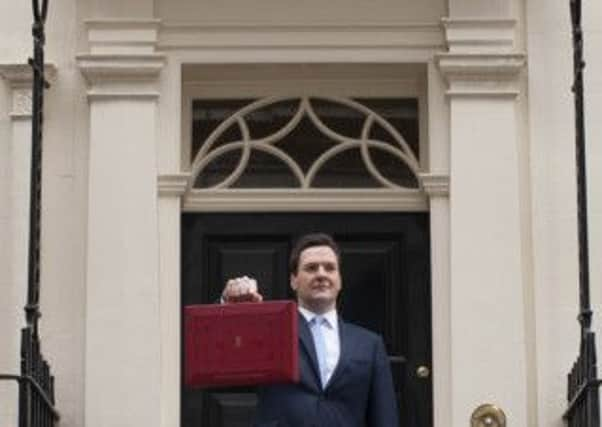Budget 2014: Osborne under pressure from savers


Pressure is growing on the Chancellor to relax the rules restricting the amount of pension savings that can be taken as cash at retirement when he delivers his fifth Budget this Wednesday.
The Liberal Democrats will also get their wish for another increase in the income tax personal allowance. But that will again be presented as the chief giveaway as the Chancellor keeps his powder dry for a 2015 Budget in which the two coalition parties will be focusing on their own manifestos. So what can we expect from the red box on Wednesday? Here are some of the most widely predicted measures:
ANOTHER HIKE IN THE INCOME TAX ALLOWANCE
Advertisement
Hide AdAdvertisement
Hide AdThe personal allowance – the amount that can be earned each year before income tax is charged – is already set to rise to £10,000 next month when the 2014-15 tax year starts. However, there is pressure on George Osborne to increase it by a further £500 to push the threshold towards the £12,500 level targeted by the Liberal Democrats.
With an election next year, this could be the last coalition tax deal before each side sets out more distinct agendas.
RELAXING THE RULES ON SMALL PENSIONS
Currently, small pension pots can be cashed in only if they have a combined value below £18,000. Standalone occupational pensions below £2,000 can also be cashed in, while over-60s can do likewise with non-occupational pensions valued at no more than £2,000.
But with around three in ten annuities bought with pensions worth less than £10,000, those restrictions may now be eased. The options include an increase in the £18,000 ceiling or allowing retirees to take pensions of £5,000 or even £10,000 as cash sums.
The move would come weeks after the regulator warned that small savers were “not well served” by the annuity market. Added urgency is provided by the surge in the number of people retiring with small pots over the coming years following the 2012 launch of automatic enrolment into workplace pensions.
RAISING THE HIGHER RATE TAX THRESHOLD
More than a million people have been dragged into the 40 per cent tax band by a series of cuts and freezes since 2010 in the level of income at which higher rate tax kicks in.
But with an election now on the horizon, the Chancellor faces calls from within his own party to raise the higher rate threshold and ease the pressure on middle-income earners.
Ronnie Ludwig, head of the private wealth group at Saffery Champness in Edinburgh, said: “Although pulling more people into higher tax is the Chancellor’s way of paying for the increase in the personal allowance, he may feel that with the next election looming, now is the time to ease the burden.”
REFORMING PENSIONS TAX RELIEF
Advertisement
Hide AdAdvertisement
Hide AdAn overhaul of the tax relief paid on pension contributions by higher earners is again on the table, even though previous predictions of reform have been wide of the mark. With shadow chancellor Ed Balls last week suggesting Labour would scrap higher rate relief to help fund youth employment projects, it may be that Osborne wants to make his move first.
Next year’s election is again a factor as restrictions are considered on a relief that benefits only the most affluent savers. Jeffrey Lewis, director at Edinburgh IFA Robson Macintosh, said: “I think the coalition is keen to increase the personal allowance, so getting rid of tax relief for the wealthy may help pay for it. I hope I’m wrong, as it doesn’t send out a great signal to people to fund for their retirement and not to rely on the state.”
CAPPING ISA SAVINGS
A widely predicted imposition of a limit on the amount that can be saved into Isas in a lifetime didn’t materialise in the Autumn Statement, yet it remains an option. The Treasury is said to be looking at a lifetime cap of around £100,000, despite industry warnings that it would undermine savings incentives. Someone who has used their maximum allowance each year since Isas were launched in 1999 would now have contributed more than £130,000.
“The Isa prediction may not arrive this year but it would not surprise me in the slightest,” said Lewis. “Some Isa funds could be worth more than £500,000 if they have been funded from inception, and I’m sure this is seen as a tax break from capital gains tax.”